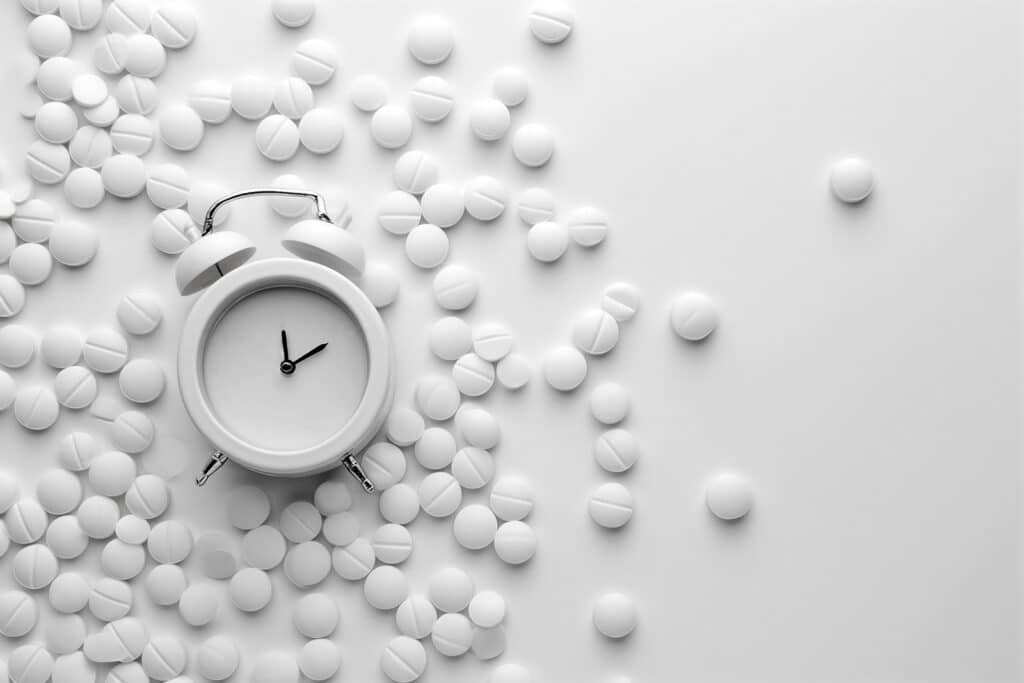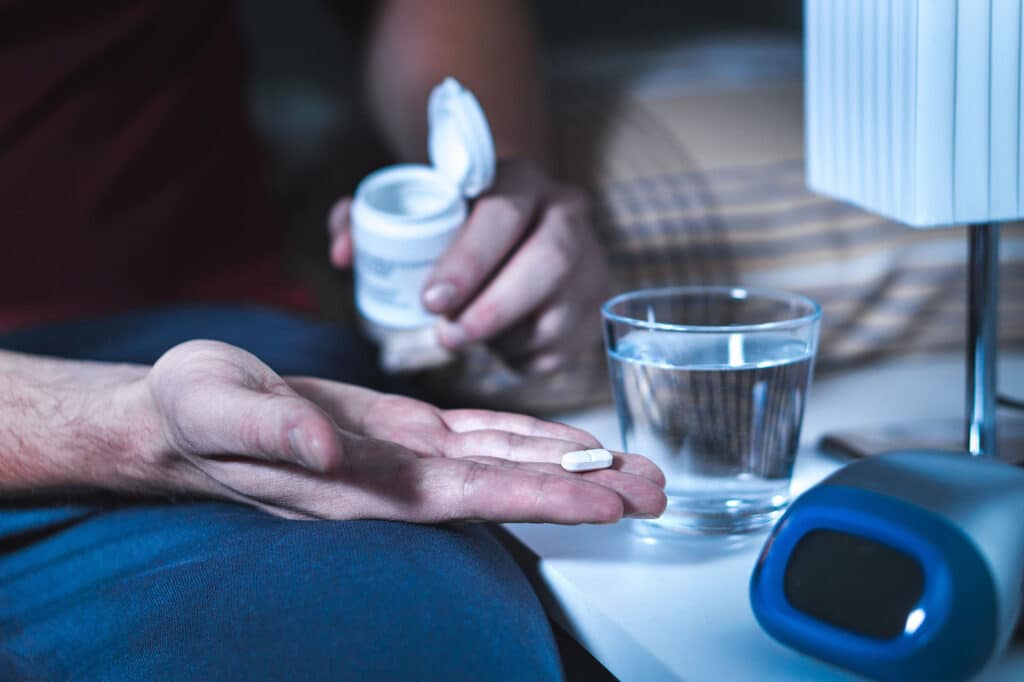People from all walks of life experience insomnia, restless sleep and related disorders. They typically suffer from interrupted rest because of an underlying problem. They might find it difficult to cope with an acute or chronic health condition, racing thoughts about life, or anxiety from the stress of day-to-day modern problems, an upcoming major event or an emergency. They then fail to receive the physical, mental or emotional rejuvenation that comes naturally with sleep. An estimated 50 to 60 million people across the United States struggle with these issues.
Eventually, after some people grow increasingly fatigued and irritable, suffer mood changes or cognitive decline, or make serious mistakes, they turn to modern medicine and sleeping aids, such as prescription gel capsules, tablets, liquids and injections, to fall asleep more quickly or stay asleep longer. In some cases, the drugs assist them by altering their mood or thought processes or relaxing their muscles.

Yet, these medications are dangerous. Some ingredients cause adverse reactions and brain chemistry changes that promote dependency and harsh withdrawal symptoms. People who have natural addictive tendencies or accidentally or purposely misuse the drugs are at the highest risk for becoming addicts. Addiction to “sleeping pills” is like addiction to any other substance. Sleeping pills can even act as gateway drugs.
Sleeping pill addiction causes many physical and emotional challenges. Although no one can guarantee that every treatment solution provides all addicts with the same outcomes, medical professionals know that recovery is possible with the right help. This guide can help you better understand this topic for yourself or a loved one and find the solutions that match your unique needs and situation.
Table of Contents
Sleeping Pill Addiction: Common Signs and Symptoms
People who abuse sleeping pills are at higher risk for serious health problems like heart disease and cancer, and even death. If you can relate to any of the following scenarios, then you’re likely addicted to sleeping pills:
- You’ve grown increasingly and unhealthily dependent on the medication and need more pills over time to receive any benefit.
- You have increased your dosage without approval from a medical provider certified to provide guidance and instructions.
- Your physician refused to increase your prescription, or you’ve used up your prescription too fast, and you’ve sought care and additional prescriptions from different doctors.
- You deny that you’re dependent even when you can’t sleep through the night without this type of sleep aid.
- Your anxiety, anger, depression or irritation have increased as well while on the medication or when others point out your dependence.
- You tried to quit the medication one or more times, experienced severe withdrawal symptoms, and failed to stop.
- You became temporarily comatose, experienced seizures or nearly died because of taking too much of the medication.
- You suddenly started to experience new sleep disorders that involve partial wakefulness, such as walking, eating or driving while mostly asleep.
- Your cravings for sleeping pills and bedtime and your pill scheduling and usage have become more important than your academic, job and social responsibilities.
- You’ve recognized the negative effects of using sleeping pill in your life and, yet, you refuse to quit.
Of course, the first signs aren’t always so obvious. You might have the following physical symptoms of addiction or withdrawal that can mimic adverse drug reactions or even other medical conditions:
- Blurred vision
- Chest, arm or shoulder pains
- Cognitive issues
- Daytime sleeping or anytime sleep apnea
- Diarrhea, heartburn, nausea, stomach pain or vomiting
- Extreme fatigue
- Focusing difficulties
- Hallucinations
- Heartbeat irregularity
- Increased or sudden mood changes
- Facial swelling or overall inflammation
- Lack of coordination
- Memory loss
- Mood swings
- Organ damage
- Painful headaches
- Partial or total shaking
- Physical unsteadiness or weakness
- Respiratory issues
- Slurred speech
- Strange dreams

Why Is Professional Treatment Important?
Most individuals struggling with substance use can’t achieve lasting recovery without professional help. Many lack the necessary knowledge or a structured plan to overcome their drug addiction. Professional treatment provides specialized care that is often essential for recovery. For example, some people require medical detox to safely manage withdrawal symptoms, or they may need counseling and other therapeutic interventions to address the emotional and physical challenges that come with substance abuse.
Without professional assistance, every aspect of a person’s life can unravel. Drug use can lead to accidents, such as falling asleep while driving or making uncoordinated movements, like tapping the accelerator instead of the brake. It can also cause significant damage to relationships, mood, and productivity in academic or work settings. Without support, addicts often lack someone to guide them through the worst moments and help them understand that their struggles are not signs of laziness or weakness but part of the recovery process.
By entering an addiction treatment program at a qualified treatment center, individuals have access to a team of recovery specialists who have successfully helped thousands of people. These professionals have extensive experience in guiding patients through drug abuse recovery, rehab programs, and long-term care. Whether in an inpatient rehab setting or through outpatient services, having a dedicated team increases the chances of achieving and maintaining sobriety. Seeking professional treatment is key to breaking the cycle of substance use disorders, ensuring a higher likelihood of long-term success.
Why else is professional treatment critical to a lasting recovery?
- Personalized Case Management: Professionals can provide you with a flexible, custom and structured treatment program designed for your unique situation, including treatment that focuses both on the current problem and any underlying ones that caused the sleep issues from the start; therapies catered to withdrawal from specific sleeping drugs; consideration of any other health issues that might interfere with detox and treatments; complications of withdrawal and other areas. Medical and rehabilitation professionals have skills to adapt the plan to take into account lifestyle, medication, overall therapy, sleep pattern and other changes that might become necessary over time.
- Supportive Holistic Approaches: Recovery centers often offer a wide range of treatment options for whole body improvement. Instead of merely focusing on addiction, these approaches emphasize your entire well-being. For example, your team might recommend ways to improve sleep, such as art or group therapy, cognitive behavioral therapy or lifestyle changes that reduce the need for medication. These approaches can help you feel less isolated or lonely and improve other areas of your life that previously caused or exacerbated your condition.
Treatment Options at Illinois Recovery Center
When you’re ready to seek treatment for sleeping pill addiction, you can expect confidential inpatient residential and outpatient treatment recommendations. You typically begin in an inpatient setting where you gradually stop using sleep medication, such as z-drugs like Ambien or Lunesta, through a tapering process and possibly with the help of special sleeping pill detox medications. Under caring medical supervision, you may experience a wide range of sleeping pill withdrawal symptoms, including drowsiness, agitation, mood swings, and even rebound insomnia. After detox, you will transition to therapies that address the root causes of your sleeping pill abuse and help resolve the underlying trouble sleeping that led to sleeping pill addiction in the first place.
The Illinois Recovery Center offers a variety of services, including sleeping pill rehab for individuals struggling with habit-forming medications like benzodiazepines (Xanax) or sedative-hypnotics like zolpidem and Sonata. Their care levels include medical detox for opioids and over-the-counter medications, medication-assisted treatment, residential inpatient care, partial hospitalization, and intensive outpatient therapy. All treatments are personalized to your needs using evidence-based methods to ensure the best outcomes.
Maintaining Sobriety: Long-Term Recovery and Support
Long-term recovery is crucial when dealing with sleeping pill addiction, especially with substances that have negative consequences from long-term use, such as melatonin supplements or prescription medications like Ambien and Lunesta. Illinois Recovery Center focuses on providing long-term recovery assistance, addressing issues such as sleepwalking, boundary setting, and monitoring prescription drug usage. Their aftercare programs are designed to help you manage the side effects of sleeping pill abuse and teach you how to build a healthier lifestyle free from receptors targeted by short-term or habit-forming drugs.

By helping you rebuild self-esteem and relationships and teaching you relapse prevention strategies, Illinois Recovery Center ensures that you have the tools necessary for long-term sobriety. Their recovery specialists are committed to supporting you on the journey to an addiction-free life.
Recovery IS Possible With the Right Help
You or a loved one don’t have to face the challenge of overcoming sleeping aid addiction alone. With the right help, long-term sobriety is within reach. Whether the addiction is solely to sleep aids or part of a larger issue involving co-occurring disorders, such as mental health challenges or other substance use problems, professional treatment can make all the difference. The first step simply requires desire, faith, and a phone call.
Whether you’re a resident of Illinois or an out-of-towner willing to travel in search of the best treatment options, the Illinois Recovery Center offers compassionate, knowledgeable medical professionals. We provide personalized plans and a variety of treatment strategies to support recovery from sleep aid abuse and other substances. We also incorporate support groups and other therapeutic resources to address the root causes of addiction, ensuring comprehensive care.
Please contact Illinois Recovery Center to learn about Sleeping Pill Addiction Treatment near you.



